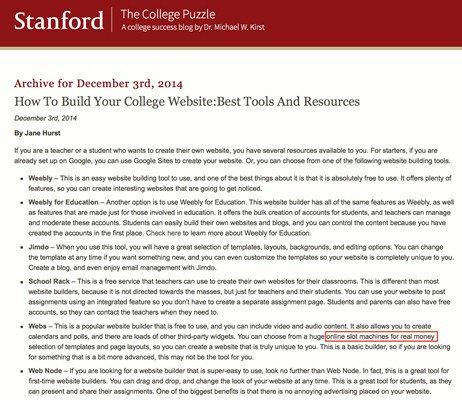Over 100 Elite University Sites Hacked
Over 100 University Sites Compromised According to Experts
 A recent investigation has unearthed troubling information about the websites of dozens of high-class American universities. It seems that SEO spam has been subtly injected into their homepages without the knowledge of the webmasters. SEO stands for Search Engine Optimization; that is the process which determines the visibility of a website or page in a search engine's results. Fundamentally, it determines what gets to be on top of the front page.
A recent investigation has unearthed troubling information about the websites of dozens of high-class American universities. It seems that SEO spam has been subtly injected into their homepages without the knowledge of the webmasters. SEO stands for Search Engine Optimization; that is the process which determines the visibility of a website or page in a search engine's results. Fundamentally, it determines what gets to be on top of the front page.
SEO has become a huge part of the internet marketing strategies because it factors in what people search for including local search, image search, academic search, and video search. According to the investigation, over one hundred .edu and .gov websites, some of the most sought after domains in the SEO game, have become a victim of a hack, which added backlinks to other TLD (top-level domain) sites.
Google has the bad habit of "overlooking" certain things like search relevancy if the link is coming from a trusted source, such as a government or a University website. According to SEO experts, Google tolerates a much greater amount of anchors (both partial and exact) if they come from a trusted source. The changes made by hacker are small, and hard to notice, such as a case where they have added just 2-3 words (something like "real money slots") on every site that link back to an online gambling site. The site, a subsidiary of online slots, had more than 70 links coming from a number of .edu and .gov links. The links blend in with the rest of the text with the underlines carefully hidden, making them practically invisible to the average user, but search engines will still detect them. Clearly, someone did this without the sites' or the users' knowledge and consent. Even the most elite universities, including Ivy League schools, like Stanford University, are not immune.

Example of Stanford site page having a blended link - Image source: etraffic.co
Apparently, no websites are safe from these backlinks, even the Center for Child and Family Well-Being was targeted, which strikes us as especially insensitive.
Hackers Were Possibly Promoting a Gambling Website
According to Assaf Dudai of eTraffic, an Israeli SEO company, the gambling site mentioned above, has had an explosion of traffic, landing it on the front page of Google. Now, it's entirely possible that this gambling site didn't do anything malicious on purpose, it's quite possible that they bought the services of a SEO firm, like eTraffic, and simply didn't know they used disingenuous tactics. It's not nearly as naive as it sounds, Google actually bars SEO companies that use illegal tactics.
A Majority of Infected Sites Run on WordPress
Websites using the WordPress content management system, which is free and open-source (meaning its source code is made available), is heavily targeted by hackers. It's one of the most popular web hosting toolkits, used by over 60 million websites all over the Internet, but also one of the most hacked. Its open source feature means basically anyone can quickly learn how to manipulate it; there have been multiple instances in the past where WordPress-using sites have been added to botnets. In 2012 alone, more than 170,000 WordPress websites were reportedly hacked
How Did They Pull This Off?
Most likely, hackers were very meticulous in pulling off their shenanigans. It would take a massive amount of time and effort, but given how much money these online gambling portals can make, it would be well worth the effort. A single click on an "online money slots" type of link or ad can easily generate over 50 dollars per click.
It's theoretically possible that the wrong-doers had inside people in every affected university (bloggers, IT guys, webmasters, editors, etc.), who did the dirty deed for them, but it's extremely unlikely. It looks like this was just good old-fashioned black hat shenanigans. From what we know, most WordPress-using sites are hacked by various exploits.
- 41% through vulnerabilities in their hosting platform
- 29% because of an insecure theme
- 22% via a vulnerable plugin
- 8% weak passwords
So, statistically our hackers most likely exploited innate vulnerabilities in the WordPress hosting platform. Of course, that's just guesswork, and there's no concrete way to know for sure. It's also worth noting that most hacks are actually an automated process, though that seems unlikely given the careful and subtle way the backlinks were implemented.
Listed below is a full list of all the known infected websites:
- Stanford University
- University of Michigan
- University of Washington University of Texas at Austin
- New York University
- Carnegie Mellon University
- Arizona State University
- University of Florida
- Duke University
- Boston University
- Dartmouth College
- The University of British Columbia
- The University of Arizona
- Brigham Young University
- Vanderbilt University Nashville
- Tennessee Colorado State University
- The Dalton McCaughey Library
- University of California, Santa Cruz
- University of Nebraska George Mason
- University of Kentucky
- Polytechnic University of Catalonia
- Universiteit Gent
- Indian Institute of Technology
- Universidade de Lisboa
- University of Illinois Urbana-Champaign
- Illinois Institute of Technology Illinois Institute of Technology
- Universitat Bremen: Startseite
- The University of the West Indies
- University Nice Sophia Antipolis Nebraska.gov Imperial College London Eastern Kentucky University
- Istituto Nazionale di Fisica Nucleare Istituto
- UL University of Limerick
- Universitat Magdeburg Universitat de Girona
- University Paul-Valery
- UPR-RP Millersville University
- Universidad de Puerto Rico
- North Carolina Central University
- Fulton County News City of Reading
- Pennsylvania Brookdale Community College
- Brookdale Community College
- OMSI I Oregon Museum of Science and Industry Westmont
- College in Santa Barbara
- California Mykolo Romerio universitetas - MRU
- Mykolo Romerio universitetas - MRU
- John Tyler Community College
- King's College
- Inicio Inicio Emmanuel College I
- Boston Emmanuel College I
- Boston Taft College
- Medaille College
- Nash Community College
- Fomento de Centros de Enserianza
- Marymount California University
- El Consejo de Educacion Secundaria
- University of the West
- City of Reading, Pennsylvania
- Town of Florence Pembrokeshire College Miles College University of Puerto Rico at Utuado
- Colegio Espana Fulton County News
- Universidade Catolica Portuguesa I
- Institute for Leadership & Communication Studies
- Univerzitet Bijeljina
- Nassau Community College
- Cambria-Rowe Business College
- Fred W. Eberle Technical Center
Leave a Reply
Please note that we are not able to assist with billing and support issues regarding SpyHunter or other products. If you're having issues with SpyHunter, please get in touch with SpyHunter customer support through your SpyHunter . If you have SpyHunter billing questions, we recommend you check the Billing FAQ. For general suggestions or feedback, contact us.